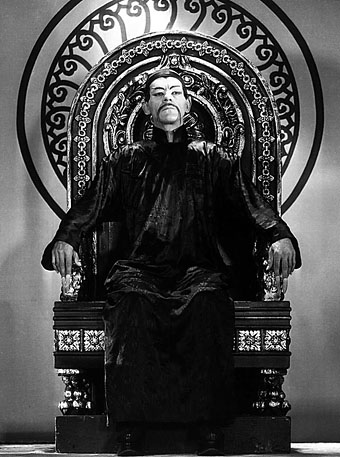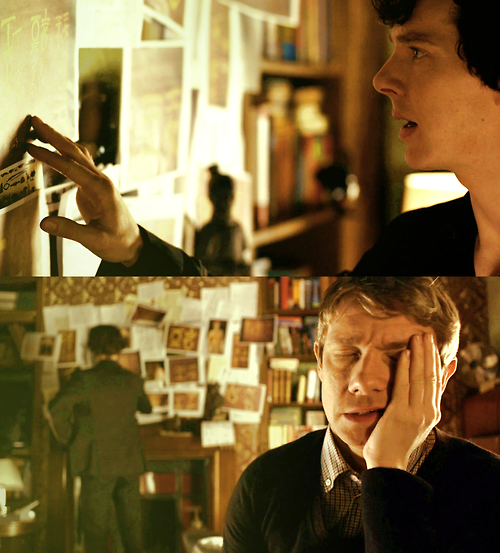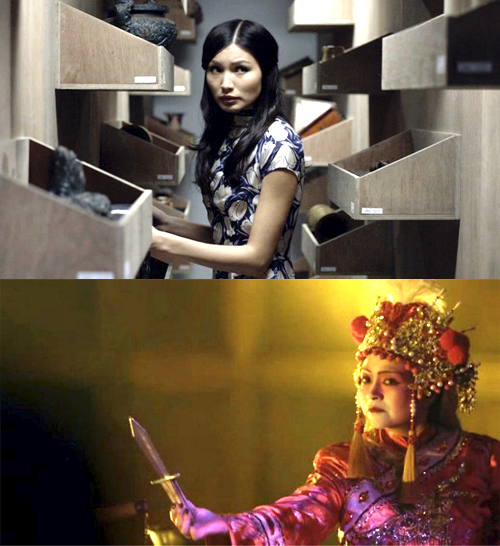 or the End of a Perfectly Good Moustache
or the End of a Perfectly Good Moustache
The adventures of Sherlock Holmes, as they were genuine adventures, were always embellished with flourishes of the exotic. Doyle knew his audience, and Britishers who had never so much as set foot outside their own nation thrilled to accounts speckled with not merely Indian swamp adders (which do not exist) but pint-sized, blowdart-wielding, cannibalistic, “naturally hideous” Andaman Islanders (who do not exist either) and “rascally Lascars” (who may possibly exist, but surely would fail to appreciate the description). As stories, they are products of an empire-building nation preoccupied with tales of faraway lands. I wonder, though, when presented with the second episode of BBC's rightly lauded series Sherlock, entitled “The Blind Banker,” whether we need quite such a dose of the same aesthetic these days, within the context of modern adaptations. I strongly suspect we don't.
 “The Blind Banker” begins with a theme that never fails to tickle Sherlockian purists: the My Roommate Would Never Be Tolerated by Just Your Average Joe from Craigslist motif. And Martin Freeman's John Watson is a man of admirable patience. Within minutes, it's clear that Sherlock has probably never purchased his own groceries in his entire adult life, that it is easier for him to hack into his flat mate's computer than to cross the room to fetch his own, and that money is only ever a theoretical construct, rather than a commodity to be earned by means of a mysterious practice called a “job.” By the end of the episode, he has also gate-crashed—and quite predictably ruined—the only romantic interlude John has managed to come by since moving into Baker Street, presumably. I don't claim to have met the Sherlock Holmes of Doyle's original canon, but I've read a very great deal about the lad, and it all rings perfectly true. This is the man who remits his own consulting fee whenever it suits him, who gets into the dumps and won't speak a word for days on end, and who allows criminal relics of unknown origin to turn up in butter dish—or, as Watson darkly hints, even less desirable places. And the chemistry between the Impossible Supergenius/Socially Inept Flatmate and the Entirely Normal Bloke clicks along between Cumberbatch and Freeman like a house aflame. “We're going out tonight,” Sherlock announces. “I need some air.” John declines, as he has a date, and then finds it necessary to explain that a date is where two people who like each other go out and have fun. “But that was what I was suggesting,” the detective returns. “No,” says John, “it wasn't.”
“The Blind Banker” begins with a theme that never fails to tickle Sherlockian purists: the My Roommate Would Never Be Tolerated by Just Your Average Joe from Craigslist motif. And Martin Freeman's John Watson is a man of admirable patience. Within minutes, it's clear that Sherlock has probably never purchased his own groceries in his entire adult life, that it is easier for him to hack into his flat mate's computer than to cross the room to fetch his own, and that money is only ever a theoretical construct, rather than a commodity to be earned by means of a mysterious practice called a “job.” By the end of the episode, he has also gate-crashed—and quite predictably ruined—the only romantic interlude John has managed to come by since moving into Baker Street, presumably. I don't claim to have met the Sherlock Holmes of Doyle's original canon, but I've read a very great deal about the lad, and it all rings perfectly true. This is the man who remits his own consulting fee whenever it suits him, who gets into the dumps and won't speak a word for days on end, and who allows criminal relics of unknown origin to turn up in butter dish—or, as Watson darkly hints, even less desirable places. And the chemistry between the Impossible Supergenius/Socially Inept Flatmate and the Entirely Normal Bloke clicks along between Cumberbatch and Freeman like a house aflame. “We're going out tonight,” Sherlock announces. “I need some air.” John declines, as he has a date, and then finds it necessary to explain that a date is where two people who like each other go out and have fun. “But that was what I was suggesting,” the detective returns. “No,” says John, “it wasn't.”
The case itself is purported to be very loosely based on “The Adventure of the Dancing Men,” a thrilling little number in which a series of mysterious hieroglyphs drives a newly wedded woman out of her head with fright, and her concerned husband engages Holmes to discover what they mean. But “The Blind Banker,” with its series of threatening Suzhou numerals presaging multiple murders, owes a far greater debt to the opening chapter of The Valley of Fear, in which a cipher requires that both the sender and the recipient own the identical reference book. London A to Z proves to be the code-breaking title, after Sherlock and John have been led a merry chase through Chinatown, the halls of high finance, and a very entertaining interlude with a street artist whose graffiti seems a deliberate homage to Banksy.
Which is all well and good, until we come to the villains of the piece.

The original Sherlock Holmes stories often subverted the established class paradigms: Holmes was always extravagantly disinterested in whether the given client's blood was blue, for instance, and “The Yellow Face,” while in some ways plot-problematic, is a nicely clear argument against racism. But I wish “The Blind Banker” hadn't ruthlessly slain its too-sexy-to-be-allowed-to-live protagonist, and that the heir apparent to Fu Manchu hadn't been responsible, nor the character's own brother. As tvtropes.com so aptly notes, Fu Manchu “probably bears direct responsibility for killing off an entire facial moustache style among the East Asian peoples of the world, a feat only matched by Adolf Hitler (who killed off his particular style among just about everyone).” If this is how he is to be remembered, then let Fu Manchu be just that. A memory. There are some themes that simply don't bear revisiting.
Lyndsay Faye, author of Dust and Shadow and The Gods of Gotham, coming Winter 2012 from Amy Einhorn Books/Putnam. She tweets @LyndsayFaye.

This episode is definitely walking the tightrope of orientalist stereotypes (and perhaps fell off a couple of times…) I love your tongue-in-cheek angle. I certainly was more amused than offended at the hilarious, one-dimensioned depiction of the Chinese community!
All in all the show seems to carry on the Odd Couple atmosphere of Holmes as an autistic savant Oscar, and Watson as the fastidious Felix with a journal. I always wondered if either man had a social life outside of that apartment on Bakers Street. Good to finally know the answer.
OMFG! The Tongs,not ‘a tong’ are Chinese mafia.They are a multi-million pound organization who operate world wide. The show isn’t trying to perpetuate a stereotype of Chinese people, rather that small organisation stemming from a larger group. Also, the villains in this aren’t circus performers, that is their cover to stay in the country unnoticed. This summary you gave makes me wonder if you even watched the episode at all.
Thnaks for Shaering it